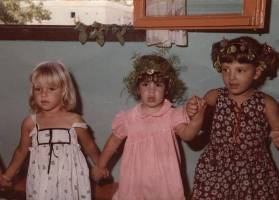A Theatre of Our Own
Permanent link
Janet Ulrich Brooks, playing Golda
On January 2, 1948, Golda Meir stood, unexpected, before Chicago’s Council of Jewish Federations to appeal for the financial support necessary to arm the Jewish forces fighting for an Israeli state.
Today, actress Janet Ulrich Brooks stands on the stage of Pegasus Players’ production of Golda’s Balcony , reenacting this pivotal moment in Israel’s history. “I have no speech,” she says, giving voice to Meir’s historic words. “I’ll tell you what’s in my heart.”
Pegasus Players is the theatrical heart of Chicago’s Uptown neighborhood, and it too has a passionate appeal and an ambitious mission: “To produce the highest quality artistic work and to provide exemplary theatre, entertainment and arts education at no charge to people who have little or no access to the arts.” While this mission has taken the company on two theatrical tours in the Middle East, Pegasus remains strongly grounded in its local community, providing creative opportunities for young playwrights, school children, and underserved populations.
Artistic Director Alex Levy has worked with Pegasus Players for nine years, winning numerous awards and citations, and championing the unique community that both supports and benefits from this theatre’s socially progressive objectives. He chose Golda’s Balcony to close this season.
Golda’s Balcony is a challenging play, and I wondered how the overt politics of this decidedly Jewish work would be received in such a diverse community. According to the 2000 census, Uptown is home to about 27,000 white residents, 14,000 African American residents, 13,000 Hispanic/Latino residents, and 5,500 Asian residents. To me, this show seemed a brave, and risky, choice. Levy responded with confident nonchalance, “We very rarely play ourselves on stage. Theatre companies start to reflect their community. Presenting this work to an audience whose life is very different is actually a wonderful thing.”
The production, wonderful as it is, left me troubled. Chicago, with a Jewish population of over 270,000, has the fifth largest concentration of Jews in the United States. With over 200 theatre companies, Chicago’s theatre scene can cater to the individual needs of specific communities. Theatres such as Black Ensemble Theater and Teatro Vista explore the work and histories of their own ethnicities. Teatro Luna, Stockyards Theatre Project, and Rivendell Theatre Ensemble celebrate women theatre artists. About Face Theatre creates work that addresses the concerns of the LBGT community. Other companies are dedicated to children and family programming, stage combat and movement, even culinary entertainment. Why then has our Jewish community, a community that comprises almost ten percent of Chicago’s population, not been able to consistently support a single Jewish theatre?
“The push [for a Jewish Theatre] needs to come from the community,” Levy explains, acknowledging that Chicago’s theatrical community consistently produces work by Jewish artists and writers. “Other theatres can pick up the slack, but there isn’t a central home.”
When theatres presenting Jewish works are not situated within the Jewish community, hard questions can go unasked and stereotypes go unquestioned. “There is a lack of historical memory. Events are not understood in a historical context.” But Levy also acknowledges the temptation to present work that celebrates a culture without also exploring the problems and challenges that culture faces. Theatre allows a community to examine itself critically, creating a dialogue for change—which is why I think the absence of a Jewish theatre, despite the wealth of Jewish shows being performed, is important.
Jewish stories and themes are part of the cultural dialogue of Chicago, and Uptown, with its rich artistic heritage, is a neighborhood well-known for challenging convention. Golda’s Balcony rises to the challenge. Harsh, unyielding, and undeniably honest, this production successfully celebrates a woman and a nation, but never once shies from the harsh realities of this history. To speak one’s heart is a dangerous thing. Fortunately, Pegasus Players is lending its voice.
Golda’s Balcony runs through June 29 at Pegasus Players, 1145 W. Wilson. Discounted tickets are available by using the promotional code FriendsofJUF.




.jpg)



